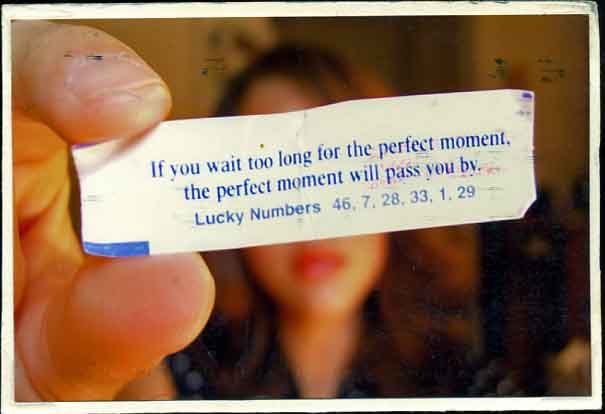Decision Making

So, I have been listening to a lot of enlightening media lately, and they seem to have a central theme. The moment. Most of us get caught up in the day-to-day living of life, in which we are always tuned into thinking about things that don’t necessarily apply to right now. If you want to overcome procrastination, you must respect the moment.
With this economy, it sure is easy to drift away thinking about this bill or that bill, or how we are going to pay this or that. With the election season caught, we get thinking about the worse case scenario if this candidate gets into office or if that candidate gets into office. continue
![]() Tweet This Post
Tweet This Post ![]() Digg This Post
Digg This Post ![]() Stumble This Post
Stumble This Post
- Bookmark :
- Digg
- del.icio.us
- Stumbleupon
- Redit it
Jun

Ok, I have a 2.5 year old baby girl and a 6.5 year old son. They are constantly telling me what they want. “I want this, daddy! I want that, daddy!” What they don’t realize is that wanting, hoping and wishing for things, just don’t work. It would seem that most adults don’t realize this either, so it inspired this blog post.
When you want, wish or hope for anything, what happens is the universe listens… and you receive the feeling of “wanting, wishing or hoping”… you DON’T actually GET what you are wishing, wanting and hoping for. Instead you get the feeling and experience of wanting.
“So, Travis”, you say… “How are we to manifest our desires then?”
Well, this is tricky… Instead of wanting, wishing and hoping… you DECIDE in advance the outcome you desire. You CHOOSE for things to be. When you focus on your decision and your choices, then the universe and God work in a different way. It combines effort with your subconscious mind to help you FIND the way to make your desire occur.
It is better to give your mind decisions and choices, as it can work FOR you, instead of AGAINST you as it does when you are wanting, wishing and hoping.
Does this make sense?
This is truly “The Secret” to making things happen for you in this life. Decide in advance. Create the pathway and then walk down the pathway you created. Everything starts in the mind as a thought. When we then desire something, instead of wanting, wishing and hoping… you MUST DECIDE IN ADVANCE YOUR OUTCOME. If you remember this, you will be successful beyond your expectations. No Wanting. No Wishing. No Hoping. Just deciding.
It’s that simple. Now all I need to do is to get my kids to understand this principle.
Successfully,
Travis Wright
![]() Tweet This Post
Tweet This Post ![]() Digg This Post
Digg This Post ![]() Stumble This Post
Stumble This Post
- Bookmark :
- Digg
- del.icio.us
- Stumbleupon
- Redit it
Apr
Two Rules for Business Start-ups
Posted by (1) Comment

Entrepreneurship is the art of finding profitable solutions to problems. Every successful entrepreneur, every successful businessperson has been a person who has been able to identify a problem and come up with a solution to it before somebody else did. Here are the five rules for entrepreneurship.
Find A Need And Fill It
First, find a need and fill it. Ross Perot, when he was working for IBM, saw that his customers who were buying IBM computers, needed help in processing their data. He went to IBM with this idea and they said they weren’t interested, so he started his own business. He eventually sold it out for $2.8 billion dollars. He found a need and he filled it.
Find A Problem And Solve It
The second rule is to find a problem and solve it. A secretary working for a small company began mixing flour with nail varnish in order to white out the mistakes she was making in her typing. Pretty soon, her friends in the same office asked if she could make some for them. So she began mixing it on her kitchen table. Then, people in other offices started asking for it, and she eventually quit her business and worked full time creating what is today called Liquid Paper. A few years ago, she sold her company to Gillette Corporation for 47 million dollars.
Customers for Life
The highest paid salespeople and the most profitable companies have the best reputation for customer service. You learn a series of low-cost, no-cost ways to get customers to buy from you, buy again, and tell their friends. A satisfied customer is 10x easier to sell to than a new customer. A referral from a satisfied customer is 15x easier to sell to than a cold call.
continue
![]() Tweet This Post
Tweet This Post ![]() Digg This Post
Digg This Post ![]() Stumble This Post
Stumble This Post
- Bookmark :
- Digg
- del.icio.us
- Stumbleupon
- Redit it
Mar
16 Rules I Try to Live By
Posted by (5) Comment
by GoDaddy.com Founder, Bob Parsons
Of all the articles I’ve written for my Blog, this was the most popular. I’ve received many comments from readers saying they felt that part of, or all of, this article has either helped them with either something they were dealing with, or something they wanted to accomplish. Perhaps you will also find it interesting and/or helpful as well.
Late in 2004, I was asked by BizAz Magazine (a local Phoenix magazine) to speak at one of its “Business Beneath The Surface” breakfast meetings. As part of the event, participants have the option of submitting questions to the speakers, which are then answered during the breakfast.
One of the questions directed toward me was, “What advice do you have for someone who is just starting a business?”
I liked Clint Eastwood’s rules.
Also at that time, I happened to pick up a copy of Men’s Journal. Clint Eastwood was on the cover and an article featured 10 items called “Clint’s rules.” I found his rules to be interesting. They were things like, “You are what you drive,” “avoid extreme makeovers,” and things like that. As Clint Eastwood is a pretty easy guy to respect, I thought the whole rule thing was pretty cool. And the more I thought about it, I realized that over the years I had accumulated a number of principles (or rules) that I tried very hard to adhere to — and these rules (in many ways) have become the foundation for whatever successes I’ve had.
So, a few weeks before the meeting, I sat down and started typing — in no particular order — the rules I try to live by. At the breakfast meeting, I read my rules at the end of my presentation. The response was amazing. I was swamped with requests for copies of the rules. An edited list was published in the Arizona Republic newspaper a few days later. I was even called and interviewed by a local radio station about the list.
Since then, some of the rules have been edited, some consolidated, and a few new ones added. Despite those changes, the list of rules I presented that morning are pretty much what appears at the end of this post.
As I write this, I am now 54 years old, and during my life thus far I suspect that I’ve encountered more significant life events than most people ever dream about. Here’s some information about me:
I grew up in a lower middle class family in Baltimore’s inner city. We were always broke. I’ve earned everything I ever received. Very little was ever given to me.
I’ve been working as long as I can remember. Whether it was delivering or selling newspapers, pumping gas, working in construction or in a factory, I’ve always been making my own money.
And, of course, not all life events are happy ones.
I was stood up to be executed during a robbery of a gas station where I was working when I was 16. To my amazement, my would-be executioner could not muster the nerve to pull the trigger. This saved both of us. I lived, and while he went to jail, he did not go there forever. Even though there were other witnesses to the gas station robbery and assault, and other crimes he and a partner committed, I was the only one who testified against them. They both received major jail sentences.
I was with a United States Marine Corps rifle company in Viet Nam for a short while in 1969. As a combat rifleman, I learned several key life lessons that resulted in some of the rules I try to live by. I learned first hand how significant a role “luck” or karma can play in our lives. The rifle company I was assigned to, Delta Company of the 1st Batallion, 26th Marines, operated in the rice paddys of Quang Nam province. We operated on the squad level (7 to 10 of us, depending on casualties), and most every night we left our command post and went several kilometers out into the rice paddys and set up in ambush. While there are many who saw significantly more combat action than me, I did see my share. After 5 or 6 weeks, I was wounded and medevaced to Japan. I returned to Viet Nam several times after that, but came back as a courier of classified documents. Although I requested (at least twice) to return to my old rifle company, the transfer was never approved.
After the Marine Corps, I used the G.I. Bill to attend college, and graduated from the University of Baltimore with a degree in accounting. I attended college mostly at night. After college, I took and passed the CPA exam. I worked only a few years as an accountant. The lion’s share of my career has been spent as an entrepreneur.
I’ve been very lucky when it comes to business.
I started a successful business division for a company called LeaseAmerica. During the four years I was involved with this business, it grew to 84 employees and wrote over $150 million dollars in small office equipment leases. Its success helped redefine how business in that industry is now conducted.
Not long after I started the division for LeaseAmerica, I started a software company in the basement of my house. I started it with the little bit of money I had, and named it Parsons Technology. I owned this business for 10 years, grew it to about 1,000 employees and just shy of $100 million a year in sales. Eventually, we sold Parsons Technology to a company named Intuit. Because my then-wife and I were the only investors, and the company had no debt, we received the entire purchase price.
Shortly after selling Parsons Technology, my wife and I decided to go our separate ways and did the customary “divide everything by two.” I then moved to Arizona and retired for a year. This was a requirement of my deal with Intuit.
Retirement was not for me.
Retirement wasn’t for me, so after the mandatory year passed, and using the money I had from the sale of Parsons Technology, I started a new business. This business eventually became The Go Daddy Group. I started this business from scratch, did it without acquisitions, and developed our own products. In the process, I came spooky close to losing everything I had, and actually made the decision to “lose it all” rather than close Go Daddy. Today, Go Daddy is the world leader in new domain name registrations, and has been cash flow positive since October 2001 (not bad for a dot com). As of this writing, I continue to be the only investor in Go Daddy.
Throughout all of these life events, I came to accumulate a number of rules that I look to in various situations. Some of them I learned the hard way. Others I learned from the study of history. I know they work because I have applied them in both my business and personal life.
And one more thing.
I’ve read many times that original ideas are rare indeed. This is particularly true when it comes to the rules herein. I can’t imagine that any of my rules represent new ideas.
My contribution is that I’ve assembled these ideas, put them to work in my life, and can attest — that more often than not — they hold true.
While I put my 16 rules together in response to a business question, I’ve been told by others that they can be applied to almost any pursuit.
Here are the 16 rules I try to live by:
continue
![]() Tweet This Post
Tweet This Post ![]() Digg This Post
Digg This Post ![]() Stumble This Post
Stumble This Post
- Bookmark :
- Digg
- del.icio.us
- Stumbleupon
- Redit it
